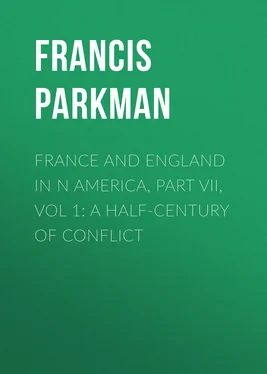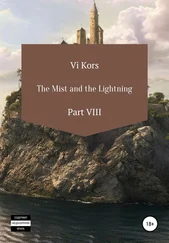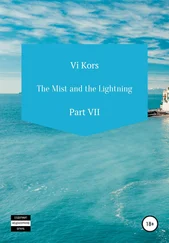Francis Parkman - France and England in N America, Part VII, Vol 1 - A Half-Century of Conflict
Здесь есть возможность читать онлайн «Francis Parkman - France and England in N America, Part VII, Vol 1 - A Half-Century of Conflict» — ознакомительный отрывок электронной книги совершенно бесплатно, а после прочтения отрывка купить полную версию. В некоторых случаях можно слушать аудио, скачать через торрент в формате fb2 и присутствует краткое содержание. Жанр: foreign_prose, История, foreign_edu, foreign_antique, на английском языке. Описание произведения, (предисловие) а так же отзывы посетителей доступны на портале библиотеки ЛибКат.
- Название:France and England in N America, Part VII, Vol 1: A Half-Century of Conflict
- Автор:
- Жанр:
- Год:неизвестен
- ISBN:нет данных
- Рейтинг книги:3 / 5. Голосов: 1
-
Избранное:Добавить в избранное
- Отзывы:
-
Ваша оценка:
- 60
- 1
- 2
- 3
- 4
- 5
France and England in N America, Part VII, Vol 1: A Half-Century of Conflict: краткое содержание, описание и аннотация
Предлагаем к чтению аннотацию, описание, краткое содержание или предисловие (зависит от того, что написал сам автор книги «France and England in N America, Part VII, Vol 1: A Half-Century of Conflict»). Если вы не нашли необходимую информацию о книге — напишите в комментариях, мы постараемся отыскать её.
France and England in N America, Part VII, Vol 1: A Half-Century of Conflict — читать онлайн ознакомительный отрывок
Ниже представлен текст книги, разбитый по страницам. Система сохранения места последней прочитанной страницы, позволяет с удобством читать онлайн бесплатно книгу «France and England in N America, Part VII, Vol 1: A Half-Century of Conflict», без необходимости каждый раз заново искать на чём Вы остановились. Поставьте закладку, и сможете в любой момент перейти на страницу, на которой закончили чтение.
Интервал:
Закладка:
Francis Parkman
France and England in N America, Part VII, Vol 1: A Half-Century of Conflict
PREFACE
This book, forming Part VI. of the series called France and England in North America, fills the gap between Part V., "Count Frontenac," and Part VII., "Montcalm and Wolfe;" so that the series now forms a continuous history of the efforts of France to occupy and control this continent.
In the present volumes the nature of the subject does not permit an unbroken thread of narrative, and the unity of the book lies in its being throughout, in one form or another, an illustration of the singularly contrasted characters and methods of the rival claimants to North America.
Like the rest of the series, this work is founded on original documents. The statements of secondary writers have been accepted only when found to conform to the evidence of contemporaries, whose writings have been sifted and collated with the greatest care. As extremists on each side have charged me with favoring the other, I hope I have been unfair to neither.
The manuscript material collected for the preparation of the series now complete forms about seventy volumes, most of them folios. These have been given by me from time to time to the Massachusetts Historical Society, in whose library they now are, open to the examination of those interested in the subjects of which they treat. The collection was begun forty-five years ago, and its formation has been exceedingly slow, having been retarded by difficulties which seemed insurmountable, and for years were so in fact. Hence the completion of the series has required twice the time that would have sufficed under less unfavorable conditions.
Boston, March 26, 1892.
CHAPTER I
The Spanish Succession.—Influence of Louis XIV. on History.—French Schemes of Conquest in America.—New York.—Unfitness of the Colonies for War.—The Five Nations.—Doubt and Vacillation.—The Western Indians.—Trade and Politics.
The war which in the British colonies was called Queen Anne's War, and in England the War of the Spanish Succession, was the second of a series of four conflicts which ended in giving to Great Britain a maritime and colonial preponderance over France and Spain. So far as concerns the colonies and the sea, these several wars may be regarded as a single protracted one, broken by intervals of truce. The three earlier of them, it is true, were European contests, begun and waged on European disputes. Their American part was incidental and apparently subordinate, yet it involved questions of prime importance in the history of the world.
The War of the Spanish Succession sprang from the ambition of Louis XIV. We are apt to regard the story of that gorgeous monarch as a tale that is told; but his influence shapes the life of nations to this day. At the beginning of his reign two roads lay before him, and it was a momentous question for posterity, as for his own age, which one of them he would choose,—whether he would follow the wholesome policy of his great minister Colbert, or obey his own vanity and arrogance, and plunge France into exhausting wars; whether he would hold to the principle of tolerance embodied in the Edict of Nantes, or do the work of fanaticism and priestly ambition. The one course meant prosperity, progress, and the rise of a middle class; the other meant bankruptcy and the Dragonades,—and this was the King's choice. Crushing taxation, misery, and ruin followed, till France burst out at last in a frenzy, drunk with the wild dreams of Rousseau. Then came the Terror and the Napoleonic wars, and reaction on reaction, revolution on revolution, down to our own day.
Louis placed his grandson on the throne of Spain, and insulted England by acknowledging as her rightful King the son of James II., whom she had deposed. Then England declared war. Canada and the northern British colonies had had but a short breathing time since the Peace of Ryswick; both were tired of slaughtering each other, and both needed rest. Yet before the declaration of war, the Canadian officers of the Crown prepared, with their usual energy, to meet the expected crisis. One of them wrote: "If war be declared, it is certain that the King can very easily conquer and ruin New England." The French of Canada often use the name "New England" as applying to the British colonies in general. They are twice as populous as Canada, he goes on to say; but the people are great cowards, totally undisciplined, and ignorant of war, while the Canadians are brave, hardy, and well trained. We have, besides, twenty-eight companies of regulars, and could raise six thousand warriors from our Indian allies. Four thousand men could easily lay waste all the northern English colonies, to which end we must have five ships of war, with one thousand troops on board, who must land at Penobscot, where they must be joined by two thousand regulars, militia, and Indians, sent from Canada by way of the Chaudière and the Kennebec. Then the whole force must go to Portsmouth, take it by assault, leave a garrison there, and march to Boston, laying waste all the towns and villages by the way; after destroying Boston, the army must march for New York, while the fleet follows along the coast. "Nothing could be easier," says the writer, "for the road is good, and there is plenty of horses and carriages. The troops would ruin everything as they advanced, and New York would quickly be destroyed and burned." 1 1 Premier Projet pour L'Expédition contre la Nouvelle Angleterre, 1701. Second Projet , etc. Compare N. Y. Col. Docs. , ix. 725.
Another plan, scarcely less absurd, was proposed about the same time by the celebrated Le Moyne d'Iberville. The essential point, he says, is to get possession of Boston; but there are difficulties and risks in the way. Nothing, he adds, referring to the other plan, seems difficult to persons without experience; but unless we are prepared to raise a great and costly armament, our only hope is in surprise. We should make it in winter, when the seafaring population, which is the chief strength of the place, is absent on long voyages. A thousand Canadians, four hundred regulars, and as many Indians should leave Quebec in November, ascend the Chaudière, then descend the Kennebec, approach Boston under cover of the forest, and carry it by a night attack. Apparently he did not know that but for its lean neck—then but a few yards wide—Boston was an island, and that all around for many leagues the forest that was to have covered his approach had already been devoured by numerous busy settlements. He offers to lead the expedition, and declares that if he is honored with the command, he will warrant that the New England capital will be forced to submit to King Louis, after which New York can be seized in its turn. 2 2 Mémoire du Sieur d'Iberville sur Boston et ses Dépendances , 1700 (1701?). Baron de Saint-Castin also drew up a plan for attacking Boston in 1702 with lists of necessary munitions and other supplies.
In contrast to those incisive proposals, another French officer breathed nothing but peace. Brouillan, governor of Acadia, wrote to the governor of Massachusetts to suggest that, with the consent of their masters, they should make a treaty of neutrality. The English governor being dead, the letter came before the council, who received it coldly. Canada, and not Acadia, was the enemy they had to fear. Moreover, Boston merchants made good profit by supplying the Acadians with necessaries which they could get in no other way; and in time of war these profits, though lawless, were greater than in time of peace. But what chiefly influenced the council against the overtures of Brouillan was a passage in his letter reminding them that, by the Treaty of Ryswick, the New England people had no right to fish within sight of the Acadian coast. This they flatly denied, saying that the New England people had fished there time out of mind, and that if Brouillan should molest them, they would treat it as an act of war. 3 3 Brouillan à Bellomont, 10 Août, 1701. Conseil de Baston à Brouillan, 22 Août, 1701. Brouillan acted under royal orders, having been told, in case of war being declared, to propose a treaty with New England, unless he should find that he can "se garantir des insultes des Anglais" and do considerable harm to their trade, in which case he is to make no treaty. Mémoire du Roy au Sieur de Brouillan, 23 Mars, 1700.
Интервал:
Закладка:
Похожие книги на «France and England in N America, Part VII, Vol 1: A Half-Century of Conflict»
Представляем Вашему вниманию похожие книги на «France and England in N America, Part VII, Vol 1: A Half-Century of Conflict» списком для выбора. Мы отобрали схожую по названию и смыслу литературу в надежде предоставить читателям больше вариантов отыскать новые, интересные, ещё непрочитанные произведения.
Обсуждение, отзывы о книге «France and England in N America, Part VII, Vol 1: A Half-Century of Conflict» и просто собственные мнения читателей. Оставьте ваши комментарии, напишите, что Вы думаете о произведении, его смысле или главных героях. Укажите что конкретно понравилось, а что нет, и почему Вы так считаете.












